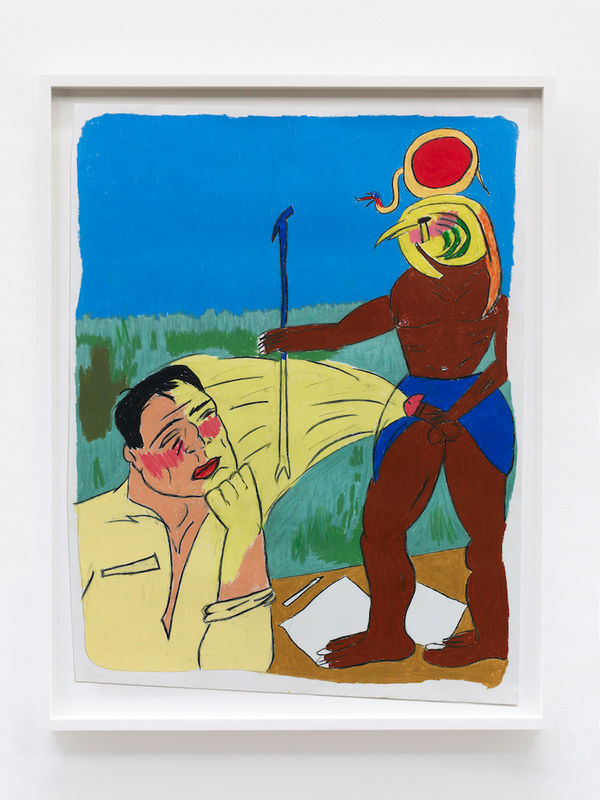YES ! AÏ AÏ AÏ AÏ AÏ AÏ AÏ ... AM Soufiane Ababri
Mendes Wood DM, Brussels, is proud to present YES! AÏ AÏ AÏ AÏ AÏ AÏ AÏ ... AM, an exhibition of drawings on paper by the Moroccan artist Soufiane Ababri.
For this solo show, Ababri has taken as a point of departure a collection of critical essays by the 20th-century French thinker Didier Eribon titled Heresies: Essays on the theory of sexuality, in which Eribon posits that the gay community constructs an identity for itself through the literature produced by a “family” of gay writers and thinkers over the centuries. “I wanted to reflect how I (WE) can rewrite my (OUR) own identity and own history using this method, and create blood ties between my homosexuality and the past, and at the same time apply an immigrant gaze, an African gaze and a post-colonial gaze,” Ababri says. In this sense, the repetition of the “AÏ” in the exhibition title places emphasis on the self, as if this act of exaggeration, repetition, resistance and pain (“Aï Aï”) were essential for marginalized communities to find grounding, stability and identity.
The artist’s desire to construct a historical family sees him conjuring up a pantheon of gay writers and artists whose intellect has changed the course of human history and development, despite their outsider status. Figures as disparate as Michel Foucault, Glenn Ligon, Allen Ginsberg, Jean Genet, André Gide populate Ababri’s works in the artist’s signature naïf style, their homosexuality the thread that connects them. The kind of militancy proposed here by Ababri is, in a sense, not political activism but art-historical, addressing the imbalances in the way history and art history have been written. The presence of these seminal historical figures form only part of the artist’s resistance, for Ababri’s method of working is also deliberately in opposition to established norms. All the drawings on display are part of a larger body of work, titled “bedwork”, that the artist began six years ago. “I wanted to get away from the idea of working in an atelier, with all its connotations of masculine rigor, and work in a stereotypically female and domestic way, on my bed,” the artist explains. His use of crayons, colored pencils and pastels instead of oil is also a deliberate distancing from the heavily gendered “Beaux Arts” drawing tradition.
“This way of working is also a way of putting myself in the position of the ‘model’ that the mostly heterosexual and white orientalist painters made use of. Those models, often women, Arabs or black slaves, were put in a situation of vulnerability and passivity. To me, my work criticizes and analyzes this process without making use of the preferred artistic tools of the dominant establishment. In this sense, drawing with colored crayons while lying in my bed is an act of resistance,” Ababri says.
Ababri will also transform the Brussels gallery into a deep-red-tinted, immersive environment, theatrical in its nature, to contextualize his work. The space will resemble the interior of an old cinema or theatre, historically seen as a clandestine space for socializing within the gay community, with obvious connotations of red as blood ties but also red as spectacle, as the red carpet that so many of these figures from history have walked on, even at a time when their kind was forced to spend most of their lives in the shadows.
Soufiane Ababri (b. 1985, Rabat, Morocco) lives and works between Paris and Tangier.
He has had solo exhibitions at Mendes Wood DM, Brussels (2021); Kulte Gallery, Rabat (2020); Dittrich & Schlechtriem, Berlin (2020); Glassbox, Paris (2019); Ravnikar Gallery Space, Ljubljana (2019); The Pill, Istanbul (2019); Space, London (2018).
Additionally, his work has been included in institutional group exhibitions at Glasgow International Festival for Contemporary Art (2021); MACAAL, Marrakech (2020); MAC/ VAL, Vitry (2019); Marathon des Mots, Toulouse (2018).
-
 Soufiane Ababri, Bedwork, 2020
Soufiane Ababri, Bedwork, 2020 -
 Soufiane Ababri, Bedwork/ Truman Capote and the dog, 2020
Soufiane Ababri, Bedwork/ Truman Capote and the dog, 2020 -
 Soufiane Ababri, Bedwork / Frank O'Hara speaking to the sun god Ra, 2020
Soufiane Ababri, Bedwork / Frank O'Hara speaking to the sun god Ra, 2020 -
 Soufiane Ababri, Bedwork/ the sleeper , 2020
Soufiane Ababri, Bedwork/ the sleeper , 2020 -
 Soufiane Ababri, Bedwork / Yes I AM, 2020
Soufiane Ababri, Bedwork / Yes I AM, 2020 -
 Soufiane Ababri, Bedwork / Yes I AM, 2020
Soufiane Ababri, Bedwork / Yes I AM, 2020 -
 Soufiane Ababri, Bedwork / Things have always happened under severed heads, 2020
Soufiane Ababri, Bedwork / Things have always happened under severed heads, 2020 -
 Soufiane Ababri, Bedwork / Marguerite Duras loving and hating Yann Andrea, 2020
Soufiane Ababri, Bedwork / Marguerite Duras loving and hating Yann Andrea, 2020 -
 Soufiane Ababri, Bedwork / Two lovers playing on a Cy Twombly carpet, 2020
Soufiane Ababri, Bedwork / Two lovers playing on a Cy Twombly carpet, 2020 -
 Soufiane Ababri, Bed work / Oscar Wilde offering André Gide a young Arab, 2020
Soufiane Ababri, Bed work / Oscar Wilde offering André Gide a young Arab, 2020 -
 Soufiane Ababri, Bedwork, 2020
Soufiane Ababri, Bedwork, 2020 -
 Soufiane Ababri, Bedwork / Albert Camus enjoying an Algerian peach in the ruins of Tipaza, 2020
Soufiane Ababri, Bedwork / Albert Camus enjoying an Algerian peach in the ruins of Tipaza, 2020 -
 Soufiane Ababri, Bedwork / The New Man reading Abû Nawâs, 2020
Soufiane Ababri, Bedwork / The New Man reading Abû Nawâs, 2020 -
 Soufiane Ababri, Bedwork / The New Man reading Ibn Battûta, 2020
Soufiane Ababri, Bedwork / The New Man reading Ibn Battûta, 2020 -
 Soufiane Ababri, Bedwork / The slap, 2020
Soufiane Ababri, Bedwork / The slap, 2020 -
 Soufiane Ababri, Bedwork/ James Baldwin penetrated by drops of water like saint Sebastian by arrows, 2020
Soufiane Ababri, Bedwork/ James Baldwin penetrated by drops of water like saint Sebastian by arrows, 2020

















